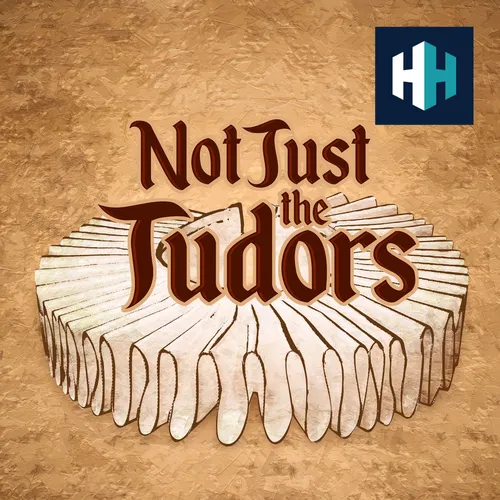
Not Just the Tudors
Professor Suzannah Lipscomb talks about everything from the Aztecs to witches, Velázquez to Shakespeare, Mughal India to the Mayflower. Not, in other words, just the Tudors, but most definitely also the Tudors.
Each episode Suzannah is joined by historians and experts to reveal incredible stories about one of the most fascinating periods in history, new releases every Wednesday and Sunday.
A podcast by History Hit, the world's best history channel and creators of award-winning podcasts Dan Snow's History Hit, The Ancients, and Betwixt the Sheets.
Sign up to History Hit for hundreds of hours of original documentaries, with a new release every week and ad-free podcasts. Sign up at https://www.historyhit.com/subscribe.
Hosted on Acast. See acast.com/privacy for more information.
- Update frequency
- every 3 days
- Average duration
- 42 minutes
- Episodes
- 459
- Years Active
- 2021 - 2025

Who Painted Anne Dudley? A Tudor Mystery
For centuries, the name of an accomplished and popular portrait painter in the court of Elizabeth I has remained unknown. The renowned art historian Sir Roy Strong dubbed this artist the ‘Master of t…

Menstruation in Early Modern England
Today we know that menstruation is a biological process. There’s a great deal of scientific research that explains the menstrual cycle. But how was menstruation perceived and understood in Early Mode…

Anne Boleyn’s Final Year
Anne Boleyn’s reputation is buried beneath centuries of labels: home-wrecker, seductress, opportunist, witch, romantic victim, Protestant martyr, feminist. But a new look at the final year of Anne Bo…

The Myth of 'Western Civilisation'
'Western Civilisation' is often thought of as a continuous thread through the centuries - from classical antiquity to the countries of the modern West - connecting Plato to NATO.
But in her new book …

Katherine of Aragon: England's First Renaissance Queen
In preparation for International Women's Day this Wednesday, Professor Suzannah Lipscomb takes a look at a Queen whose reputation has largely been shaped by her husband's midlife crisis. History does…

Jews & the Inquisition in Italy
Between 1598 and 1785, the Papal or Roman Inquisition in Modena, Northern Italy, put 393 Jews on trial. Regarded as infidels, Jews were accused of, among other things, blasphemy, employing a Christia…

The Death of Amy Dudley
On 6 September 1560, Amy Robsart Dudley died after falling down a staircase at Cumnor Place in Oxfordshire. But did she fall? Was she pushed? Or did she throw herself down the stairs? These question…

The Blood Countess: Elizabeth Bathory
In the early seventeenth century, a Hungarian aristocrat called Erzsébet Báthory - or Elizabeth Bathory - was accused of murdering more than 600 young women. Her gruesome story has been sensationalis…

Mary Queen of Scots’ Lost Letters Decoded
The most important discovery related to Mary Queen of Scots for 100 years was recently made - by a team of amateur cryptologists.
In this episode of Not Just the Tudors, Professor Suzannah Lipscomb t…

The House of Guise: Europe's Most Murderous Dynasty?
The rich and powerful Guise family was one of the most treacherous and bloodthirsty in sixteenth-century France. They whipped up religious bigotry, overthrowing the king. They ruled Scotland for near…

Children in Tudor England
What was it like to grow up in Tudor England? How were children cared for, what did they play with, and which subjects were they taught?
In this edition of Not Just the Tudors, Professor Suzannah Lips…

The Murder of Christopher Marlowe
This month on Not Just the Tudors, Professor Suzannah Lipscomb investigates four of history’s most notorious murders and brutal crimes.
In this first episode, she’s joined by Charles Nicholl to dig de…

Henrietta Maria, Charles I’s Queen Consort
Charles I's Queen Henrietta Maria was perhaps the most reviled consort to have worn the crown of Britain's three kingdoms. To this day, she remains the wife who turned her husband Catholic - causing …

Marguerite de Navarre: Mother of Renaissance France
Marguerite de Navarre (1492-1549) was an influential diplomat and political activist, an outstanding patron of philosophers and artists, an accomplished writer and poet, and sister to King François I…

When London Shipped Poor Children to America
In 1618, almost 100 impoverished children from London - some as young as eight - arrived in Jamestown, Virginia to labour in the growing colony. It was the first example of transporting children to c…

Hatton: Elizabeth I's Favourite?
In the cut-throat world of the Elizabethan court, Sir Christopher Hatton became one of Elizabeth I’s favourites. After catching her eye in 1561, Hatton was quickly promoted to the Privy Council, maki…

Batavia: The Worst Shipwreck in History
In 1628, a Dutch East India flagship called Batavia set sail from the Netherlands, never to reach her destination. Eight months into the voyage, the ship was wrecked on coral reef off the western coa…

Swords in Elizabethan England
In Elizabethan England, swords were everywhere. Hanging on girdles, used in plays and depicted in paintings, they were an important marker of status and martial prowess. Swordplay was a popular marti…

Demonic Possession in 17th-Century Canada
When strange signs appeared in the sky over Quebec in 1660, the French settlers started to worry about evil forces in their midst. Then, a teenaged servant called Barbe Hallay started to act as if sh…

Nonsuch: Henry VIII's Lost Palace
In April 1538 - to celebrate the birth of Prince Edward and the 30th anniversary of his reign - King Henry VIII began work on a royal palace in Surrey, designed to be unequalled as a celebration of t…